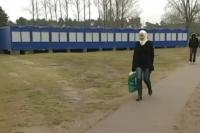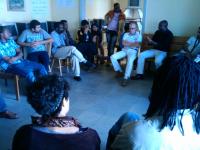Interview with two asylum-seekers about the situation in the detention centre in Eisenhüttenstadt
INFORIOT. The detention centre for asylum seekers in Eisenhüttenstadt is the first contact point for refugees who are coming to Brandenburg. Different reports appeared during the last months, especially about the situation in the complex, that is located in the outskirts of the small town, where also a deportation prison ist attached. A ZDF-report subjects the disputed deportation practices of german authorities. Also serbian Roma families living in Eisenhüttenstadt are affected by. In November the refugee council of brandenburg (Flüchtlingsrat Brandenburg) critizised the police controls between the railway station and the ZAST. These controls prevent the refugees from applying for asylum and having a free and fair asylum procedure. One reason, why the police decided to violate against the Geneva refugee conventions, could be the increasing number of refugees. According to a report of RBB, currently almost 500 people living on the site. The usual average is 250 – 300. More space is now created by container-buildings. Furthermore mold growth and disastrous hygienic conditions in the living areas have been reported. RBB reported in december on a violent disagreement between residents, where people got injured. The reason was a conflict between children. For local NPD-structures a reason, to clarify their racist profile. On their homepage the neo-nazi party fantazises about an „orgy of violence“ and a danger for the local population. Furthermore they are announcing actions, to build on already excisting prejudices and resentments within the german citizens.
Inforiot interviewed two asylum seekers, that are living currently in the ZAST in Eisenhüttenstadt.
Ali is 38 and escaped twelve years ago from political persecution from Tschad to the neighbouring Lybia. Till the end of 2011 he and his family lifed there, but when the war started, he was forced to leave the country. The family fled across the Mediterranean Sea on the italian island Lampedusa. Together with 1200 other Refugees they crossed the sea, in a very small boat. Ali described the circumstances on the two-days passage as life-threatening: people were sitting and lying on each other, got sick and the food did not last for everyone. From south-Italy Ali and his family fled to Germany and seeked in Eisenhüttenstadt for asylum.
The 22 years old Achuo came by plane from Cameroon to Europe. Also he was political persecuted in the central african country and lives now for two months in Eisenhüttenstadt.
Inforiot: What are in your opinion the biggest problems in the camp?
Achuo: There are a lot. It starts for example with translations. Whether it is with administrative documents or medical examinations. Once i had to see a doctor and I could not understand what the resulat of my examination was. I am also not satisfied with the food, it's not tasty In generall i would describe the atmosphere in the camp as calm. And it has not only to do with the living conditions in the camp. Once for example I went by train and only I got controlled by the police and the train conductor. I don't understand that.
Ali: For me an important point is hygiene. The toiletts are almost unsuitable. And when my child was sick and had diarrhea, that was a problem. We went to see a doctor, but it didn't help so much. My wife got sick as well, but both were not examined correctly. That is only one example, it is just like that, that our concerns are not taken seriously.
Inforiot: Do you think, that these problems were also a reason for the confrontation between the residence last december?
Achuo: Yes, it is the whole environment here. Also the foreigner's registration office threats the people not properly. It is obvious, that the people are frustrated.
Ali: Nobody came to start a fight, we are here, because we escaped from serious problems and to build a better life. However such situations can happen. A lot of people are very busy with their own situation, because they are traumatized, and then they are disappointed about their negative asylum procedure. I'm glad, that it's so peacful here until now.
Inforiot: Despite the tension and frustration, do you recive solidarity and mutuality among each other?
Ali: For sure there is solidarity among each other. Of course sometimes people don't get along with each other and the language-barrier also causes problems. Anyway we get along with each other, after all everybody is in the same difficult situation.
Achuo: Of course people are helping each other, as said, we war all in the same situation. We are having parties together and get to know each other. Despite the language barrier we understand each other somehow. The self-managed internetcafe is a good example, here people are coming together, help each other, talk with each other and respecting, that everybody has the possibility to use internet.
Inforiot: What do you think, when people from Germany state, that the majority of the asylum-seekers abuse the walfare-system under the pretext of political persecution?
Achuo: The little money does not help me here, that's only pocket money and it does not help me to solve my problems.
Ali: I know this way of thinking, but who is putting his life to risk, for food and 40 euro pocket money per month? If it would only be about the money or the food, me and my family would not have taken this risk, that we took during the escape. I just want to try to build a new live with my family. I'm not planning, to put my life to risk again. Espacially my children should have a new and better live here and i will support that.
Inforiot: Thank you very much for the conversation!


